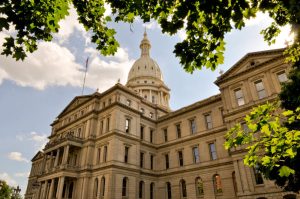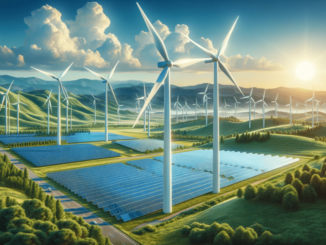
The following commentary was written by Deana Dennis, senior manager for Midwest state policy at Ceres. See our commentary guidelines for more information.
Michigan has been a manufacturing powerhouse for the Midwest and the U.S. for generations, so it’s no surprise to see it riding the massive wave of investment into clean energy manufacturing that is sweeping the nation. Since last fall, the state has seen major corporations announce more than $8 billion worth of projects and thousands of jobs to build batteries, electric vehicles, and other clean transportation solutions that honor Michigan’s history as an industrial base while seizing this opportunity to super-charge the state’s economic future.
Similar projects are popping up across the country, thanks in large part to the federal incentives in the Inflation Reduction Act. Passed last year, the nation’s largest-ever climate law is designed to cut carbon pollution while establishing the U.S. as the global leader in clean energy manufacturing, supply chains, and deployment. Already, states from all regions and governed by both parties are welcoming the huge influx of clean energy and advanced manufacturing projects.
But the activity is especially resonant in Michigan — and not only because the scale of investment is so enormous. It also represents a quick return on the state’s efforts to establish itself as a clean energy leader. It was just last year that Gov. Gretchen Whitmer unveiled the MI Healthy Climate Plan, the state’s first-ever roadmap toward tackling the climate crisis by achieving a net zero economy by 2050.
Get connected
Every morning, thousands of energy professionals turn to our newsletters for the day’s most important news. Sign up for free to get the latest delivered straight to your inbox.
While the Healthy Climate Plan is already sending a strong signal to industry, it has not yet been implemented. The plan features many important goals, such as preventing the worst impacts of climate change and addressing environmental injustices, such as air and water pollution, that unfairly harm marginalized communities. But at its unveiling, officials also emphasized that it was an economic plan. By positioning Michigan as a climate leader, they argued, the state stood to capture economic development and create legions of good jobs as companies seek out forward-looking business environments forged by strong clean energy policies.
That proved prescient: today, Michigan is a clear beneficiary of the clean energy boom in the U.S., and the state has both the federal Inflation Reduction Act and the promise of the MI Healthy Climate Plan to thank for it.
The powerful mix of public policy and private investment shows why leading companies and investors have been strong champions for ambitious federal and state climate policy. Thousands of companies across the U.S. — including more than two dozen S&P 100 companies — supported the climate measures in the Inflation Reduction Act. And the MI Healthy Climate Plan was celebrated by 15 major companies operating in Michigan, including General Motors, Ford, and Siemens. Business leaders recognize that clean energy investment comes with the promise of jobs, lower utility costs, energy security, and a more sustainable and less risky economic future.
It’s exciting to think we’re only beginning to see these many economic benefits surface in Michigan. But as other states move to pass climate and clean energy policies to prove they are open for business, Michigan policymakers can and should bolster this momentum by taking action to implement the Healthy Climate Plan.
Michigan lawmakers seem to recognize the unprecedented opportunity before them. They recently introduced the MI Clean Energy Future Plan, an ambitious suite of clean energy legislation that supports the Healthy Climate Plan. It’s highlighted by a new target of 100% clean electricity by 2035 — a policy that is both bold and feasible, and essential to meeting the state’s climate goals and fully capitalizing on this moment.
With the right policies in place, analysts believe Michigan can attract $26 billion in clean energy investment while dramatically improving public health in the coming years. It’s no wonder why. History has shown that this is a state with the industrial workforce and know-how to be a key engine of innovation not just for the U.S., but across the world. Let’s pass a 100% clean electricity standard this session to take full advantage of the opportunities of the clean energy economy and make Michigan the place where companies choose to build it.



